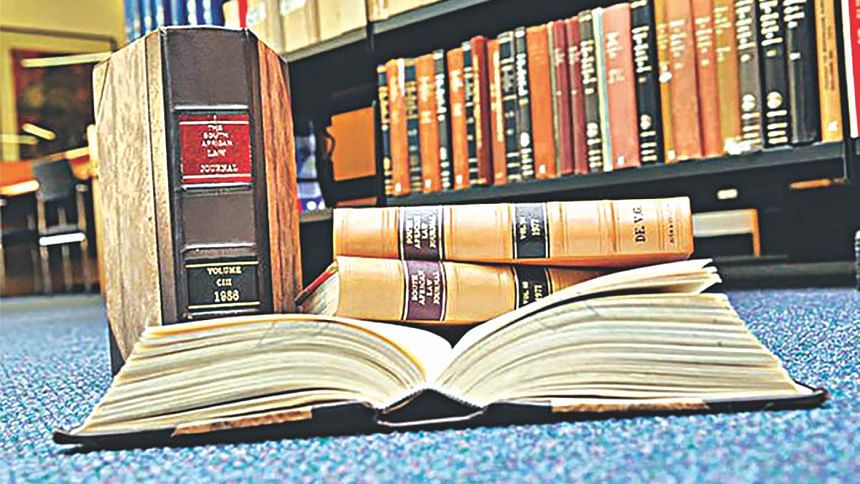Law reports should be free

The principle "ignorantia juris non excusat" is embedded in almost all the major legal systems, which roughly translates to "ignorance of the law is no excuse." Simply put, the citizens of the state must be aware of all the laws of the state and in case of breach of a law, can never put forward the defense that they were not aware of the law. Since an obligation is put on the citizens of a nation because of this principle, certain rights are also granted to successfully and conveniently fulfill this obligation. For example, it is a duty of the states to make the laws accessible to their citizens.
In Bangladesh, such right is granted through the adoption of the Bangladesh Laws (Revision and Declaration) Act 1973 (BLRDA 1973) and the Right to Information Act 2009 (RTIA 2009). The BLRDA 1973, through its section 6, requires the government to publish all the Acts of the Parliament, Ordinances and President's Orders and section 6A requires these to be published on a website. Section 6 of the RTIA 2009 requires an "authority" to annually publish its decisions, activities and proposed activities in a manner that can easily be accessed by the citizens. For the purpose of the RTIA 2009, an "authority" includes all constitutional bodies.
Article 111 of the Constitution gives a binding effect to the decisions of the Supreme Court (SC) of Bangladesh. It makes the law declared by the Appellate Division (AD) of the SC binding on the High Court Division (HCD) of the SC and the subordinate courts and the law declared by the HCD binding upon the subordinate courts. So, the judgments of the SC serve as binding laws in the national courts. Under article 111 of the Constitution, only the ratio decidendi is binding law, not the obiter dictum [as confirmed by the AD in the Moudud Ahmed and Ors. v The State and Ors. (2016) case reported in 36 BLD (AD) 33]. In the said case it was observed by the AD that "Ratio decidendi is the principle found out upon a reading of the judgment as a whole in the light of issues raised before the court and not particular words or sentences of the judgment" and to put it simply, obiter dictum is the observation made by the court in a judgment which is not necessary for determining the case. Although not binding, obiter dictum is worthy of respect and carries a significant weight in court.
Court proceedings of countries following common law legal tradition are heavily dependent upon precedents set by the superior courts as they all follow the maxim stare decisis et non quieta movere, meaning to abide by the precedents and not to disturb settled points. This is incredibly important in maintaining stability in adjudication and providing a safe standard for experts advising the lay persons. The citizens must, therefore, regulate their activities in line with these binding precedents.
But how do we get access to these precedents? Law reports publish these judgments in their monthly, quarterly, half-yearly and annual publications. If you are unfamiliar with law reports, they are the fancily bound massive books you see in law firms and lawyers' chambers. There are several law reports in Bangladesh and getting your hands on all the reports will cost you millions. It will be unreasonable to expect that the public in general will have access to these law reports as not even all lawyers have access to these. Only the wealthiest law firms can afford to buy all the law reports available in the market. This renders the obligation of citizens to know all laws next to impossible. Additionally, it is safe to say that only the wealthiest of the citizens can afford to consult a well-resourced law firm. So, citizens with low income, who cannot employ a well-resourced law firm to represent them are deprived of proper representation. It is also important to know that not all judgments get reported as the editors of these law reports decide which judgments will be published. Thus, they hold the power to deprive the citizens of knowing all relevant ratio decidendi, or worse, withhold wide dissemination of those which are not palatable to them thus limiting our access to relevant laws.
Under the RTIA 2009, the SC is also an "authority" as it is a constitutional body established under article 94 of the Constitution. Therefore, the people of Bangladesh seem to possess the right to know all decisions taken by it under section 6 of the RTIA. Some judgments are published on the SC's website, but they are extremely limited. Expecting the citizens to buy the law reports in order to be aware of the SC judgments is unfair, to say the least. The judgments are drafted in electronic copies in the SC so it can easily be published on their website. One cannot help but wonder, in a digital era, how the citizens of Bangladesh are being denied free access to these laws which should ideally be one click away! This endeavour should fit right in with the government's promise to create a digital Bangladesh with a digital judiciary.
The WRITER is a Research Associate at a law firm in DHAKA.

 For all latest news, follow The Daily Star's Google News channel.
For all latest news, follow The Daily Star's Google News channel. 



Comments